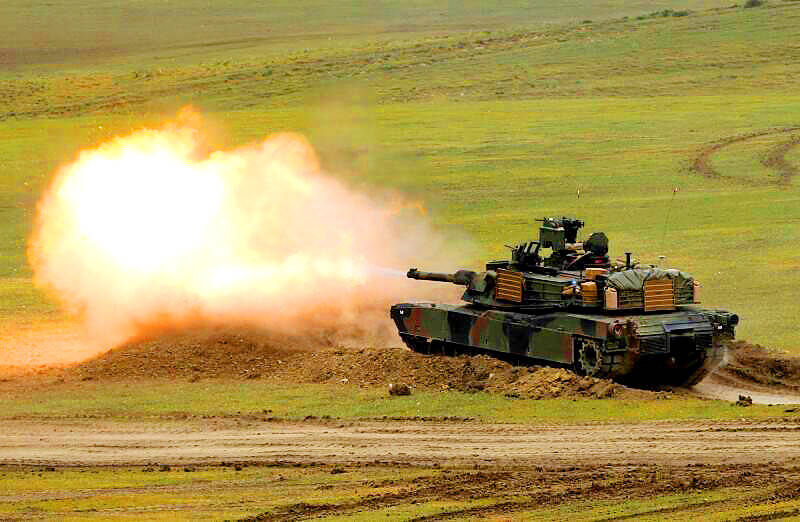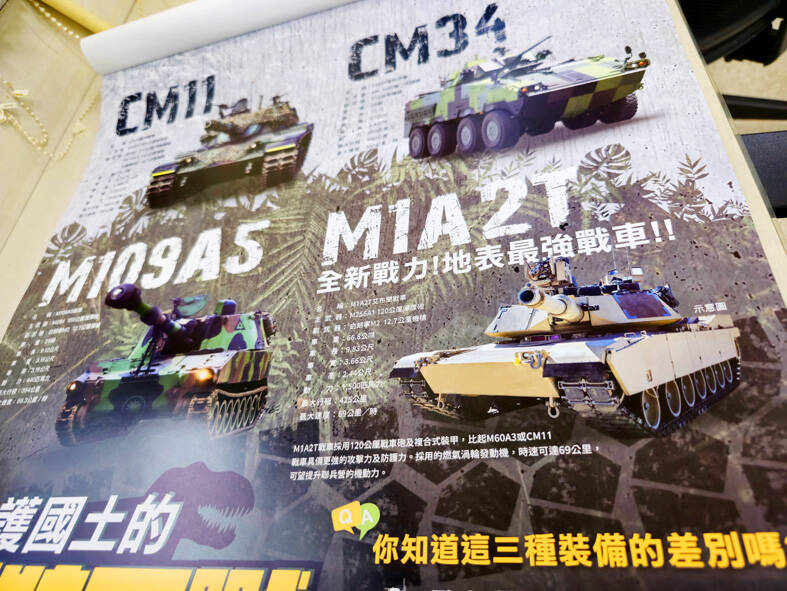A shipment of 38 US-made M1A2T Abrams tanks — part of a military procurement package from the US — arrived at the Port of Taipei early yesterday.
The vehicles are the first batch of 108 tanks and other items that then-US president Donald Trump announced for Taiwan in 2019. The Ministry of National Defense at the time allocated NT$40.5 billion (US$1.25 billion) for the purchase.
To accommodate the arrival of the tanks, the port suspended the use of all terminals and storage area machinery from 6pm last night until 7am this morning.

Photo: Reuters
The tanks are expected to be deployed at the army’s training facility in Hsinchu County’s Hukou Township (湖口), where training on the tanks would start after the Lunar New Year holiday, a source said.
The “T” in the M1A2T denotes that the tanks are a special version for Taiwan, they said.
The military is to receive a shipment of 42 Abrams tanks and another of 42 tanks over the next two years, Ministry of National Defense records showed.

Photo: Fang Wei-li, Taipei Times
The Abrams is “decades more advanced than” the combat vehicles the army currently uses, and the tank’s 120mm main gun would enable the military to compete with the main battle tanks used by the Chinese People’s Liberation Army, the source said.
“The average speed of the new tanks is also twice that of Taiwan’s current tanks, which would enhance the efficiency of troop reinforcements,” they said.
“Furthermore, the Abrams’ aiming capability is more than five times that of Taiwan’s current tanks, and it can maintain a continuous hit rate,” they added.
The M1A2Ts are equipped with a thermal management system that can significantly reduce the leakage of heat from the modern electronic equipment on board, enhancing their concealment on the battlefield, they said.
In an interview with the Liberty Times (the Taipei Times’ sister paper) published on Dec. 6, retired major general Kuo Li-sheng (郭力升) said the M1A2T Abrams tanks would be a generation ahead of Taiwan’s US-made M60A3s and the indigenously developed CM11 tanks, which have designs dating to the 1980s.
“Fielding the M1A2T would not only increase the army’s numerical strength, but would be a qualitative leap forward,” he said, adding that Taiwan has sought to acquire the tanks since the 1990s.

MAKING WAVES: China’s maritime militia could become a nontraditional threat in war, clogging up shipping lanes to prevent US or Japanese intervention, a report said About 1,900 Chinese ships flying flags of convenience and fishing vessels that participated in China’s military exercises around Taiwan last month and in January have been listed for monitoring, Coast Guard Administration (CGA) Deputy Director-General Hsieh Ching-chin (謝慶欽) said yesterday. Following amendments to the Commercial Port Act (商港法) and the Law of Ships (船舶法) last month, the CGA can designate possible berthing areas or deny ports of call for vessels suspected of loitering around areas where undersea cables can be accessed, Oceans Affairs Council Minister Kuan Bi-ling (管碧玲) said. The list of suspected ships, originally 300, had risen to about 1,900 as

Japan’s strategic alliance with the US would collapse if Tokyo were to turn away from a conflict in Taiwan, Japanese Prime Minister Sanae Takaichi said yesterday, but distanced herself from previous comments that suggested a possible military response in such an event. Takaichi expressed her latest views on a nationally broadcast TV program late on Monday, where an opposition party leader criticized her for igniting tensions with China with the earlier remarks. Ties between Japan and China have sunk to the worst level in years after Takaichi said in November that a hypothetical Chinese attack on Taiwan could bring about a Japanese

The WHO ignored early COVID-19 warnings from Taiwan, US Deputy Secretary of Health and Human Services Jim O’Neill said on Friday, as part of justification for Washington withdrawing from the global health body. US Secretary of State Marco Rubio on Thursday said that the US was pulling out of the UN agency, as it failed to fulfill its responsibilities during the COVID-19 pandemic. The WHO “ignored early COVID warnings from Taiwan in 2019 by pretending Taiwan did not exist, O’Neill wrote on X on Friday, Taiwan time. “It ignored rigorous science and promoted lockdowns.” The US will “continue international coordination on infectious

DEEP-STRIKE CAPABILITY: The scenario simulated a PLA drill that turned into an assault on Taiwan’s critical infrastructure, with the launchers providing fire support Taiwan yesterday conducted this year’s first military exercises at Longsiang Base in Taichung, demonstrating the newly acquired High Mobility Artillery Rocket System’s (HIMARS) ability to provide fire support and deep-strike capabilities. The scenario simulated an attack on Penghu County, with HIMARS trucks immediately rolling into designated launch areas and firing barrages at the Wangan (望安) and Cimei (七美) islands, simulating the provision of fire support against invading forces. The HIMARS are supposed to “fire and leave,” which would significantly increase personnel and equipment survivability, a military official said. The drill simulated an exercise launched by the Chinese People’s Liberation Army (PLA) Eastern